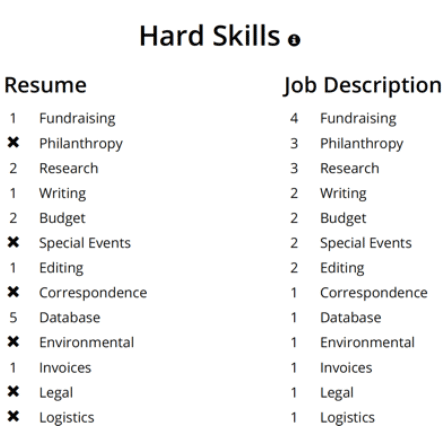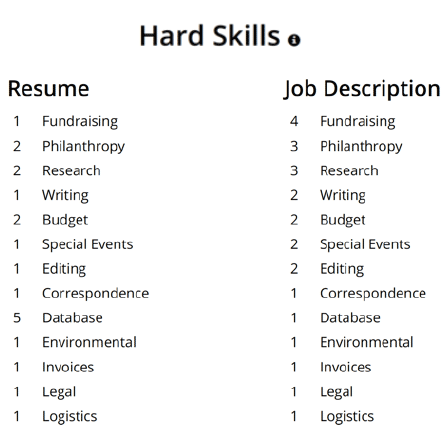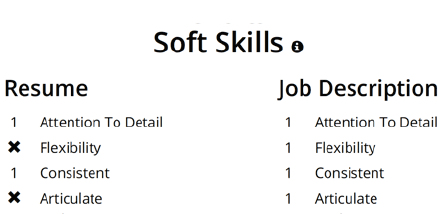By Jennifer Puccio
I graduated from a creative writing program whose motto is, “All writing is rewriting.” This couldn’t be truer when it comes to drafting resumes for job postings, especially ones using applicant tracking systems (ATS), aka scanning software.
The following are my top 10 challenges applying for positions using scanning software and how I maneuvered through them. Though these suggestions apply to any job applicant, they also address challenges technical writers can have as they attempt to “beat the machine” while also retaining a consistent tone and tense in their prose for the hiring manager who views a writer’s resume as the initial writing sample.
In brief, ATS is an app that searches resumes for keywords, often separating the results into hard skills (minimum requirements) and soft skills, which are desired skills such as “a sense of humor” or familiarity with a certain business environment. ATS also helps employers save time in the recruiting process because it rates how well your resume matches the job posting.
- 1. Hard skill keywords from the job description appear only in the singular or plural form, thus a 50/50 chance if you have included the keyword.
- Suggestion: Invest in a scanning software application to identify hard skills and how they are listed. In this Jobscan example, here are my results before and after I updated my resume. If you can, mention the skill as many times as the job posting, noted to the left of the keyword. (Wordle and TagCrowd allow you to paste text in a field to display keywords used.
One doesn’t have to be a rocket scientist to write an effective job description but ironically, the only position I achieved a scanned result of 91 percent without updating my resume was a writing position at Jet Propulsion Labs, a testimony to how well the job announcement was penned – by people working with rocket scientists. Hmm.
- 2. Soft skill keywords/phrases can be hard to quantify (i.e., attention to detail, articulate).
- Suggestion: Include a Summary of Qualifications section at the top of your resume to list soft skill keywords such as: Deadline driven, Team player, and Bilingual.
- 3. Some keywords in the job description do not qualify as hard or soft skills and would rarely if ever appear on a resume (i.e., loyalty, passion, enthusiasm) but will still be searched for in your resume.
- Suggestion: Include these keywords in a cover letter whenever it makes sense since they usually identify company values.
- 4. Job postings use the passive verb tense or gerund form of a verb.
- Suggestion: In my industry, passive verb tense is an unwelcome guest but since I want my experience to be counted as a match, I sometimes succumbed to this tense so the experience would appear in scanning software results.
- 5. Companies sometimes do not allow their Human Resources department to edit job announcements penned by an outside department, resulting in slight errors, awkward tenses and phrasing (i.e., Marketing & Communications, supervise volunteers, Qa testing).
- Suggestion: Go ahead and add atypical elements like an ampersand in a resume if it creates a match. Since many resume tasks list experience in past tense, using present tense in a job description makes it harder to craft into a resume sentence. I worked around it in this manner: “Demonstrated ability to supervise volunteers…” In another position I refused to inaccurately lower case the “a” in “Qa testing” because that is incorrect so my QA testing phrase went unnoticed by the scanners. However, since “QA” listed separately in the posting, it was picked up in another way. Note: I encourage companies to enlist technical writers to review job postings because they excel in the craft of concise writing, which also contributes to bringing in qualified candidates.
- 6. Companies allow their recruiters limited or no access to setting scanning software features to rectify job description issues.
- Suggestion: See number 5. Technical writers can also aid in setting the scanners to scan multiple verb forms of a keyword along with singular and plural forms.
- 7. Companies may look for a certain percentage match.
- Suggestion: Though impossible for a job applicant to control, it eliminates qualified candidates who may or may not have electronically compared job announcement keywords to their resume. Perhaps companies could establish guidelines that encourage a random selection of lower percentages to verify the software is processing the desired applicant pool.
- 8. Applicants applying for dual role positions or a role featured in a different department are more susceptible to a lower keyword percentage match (i.e., technical writer/system analyst or an analyst position in the marketing versus finance department).
- Suggestion: On the plus side, the resume becomes a longer writing exercise, as it should be when applying for a position a little outside one’s niche so you can demonstrate those transferable skills. It’s now okay to create longer resumes with the appropriate keywords to pass the “censors.” Bring out as many experiences as you can in the areas addressed in the job posting. For example, in the case of a marketing analyst position, I added analyst entries I don’t typically include in a formal technical writing opportunity.
- 9. Career transition applicants using transferable skills from a different industry are more susceptible to a lower keyword percentage match.
- Suggestion: This is where the job description is helpful in identifying similarities. If the different industry uses unique industry jargon for your job experience, use it! Also, you can submit a hard copy of your resume to the recruiting department or hiring manager and mention you already applied online. This shows you are a serious candidate as opposed to someone applying to anything related to her experience. Needless to say, networking is helpful in this situation as well, the de facto way of finding employment.
- 10. You don’t have that particular skill.
- Suggestion: Don’t lie! In the cover letter you may say something like, “Though I have some experience working with ___, the majority of my experience is working in the related field of ____. “
A student STC member, Jennifer Puccio is a seasoned technical writer returning to school for some additional “seasoning” and can be found on Twitter @jennxfactor for her creative pursuits and at http://jfpuccio.wix.com/jfpuccio for her technical writing ones.



